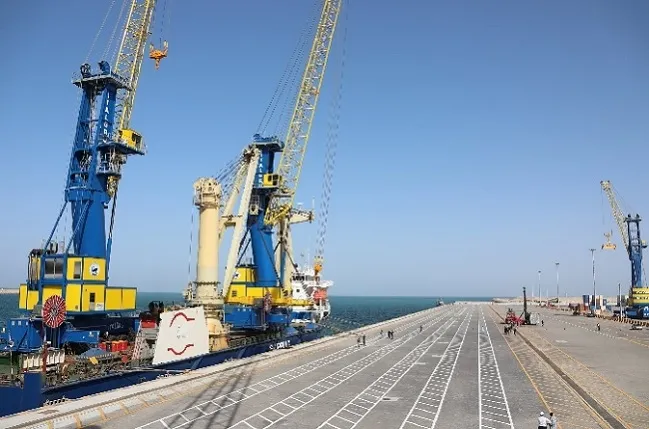How Will US Sanctions Waiver Impact India's Operations at Chabahar Port?

Synopsis
Key Takeaways
- Chabahar Port offers significant trade opportunities for India and Afghanistan.
- The recent US sanctions waiver is a crucial development for ongoing operations.
- Incentives at the port enhance its attractiveness for businesses.
- Chabahar is vital for improving regional connectivity.
- Continued development will support logistics and technology for port users.
New Delhi, Nov 10 (NationPress) In the face of challenges for traders in Afghanistan due to Pakistan's border closures, a new opportunity has arisen at Iran's Chabahar port, which is set to enhance the transit of goods, according to reports from Kabul.
The Afghanistan-Pakistan Joint Chamber of Commerce and Investment revealed that the recent border closures have resulted in over $100 million in losses for traders from both nations, as reported by Tolo News.
The Chamber highlighted the uncertainty surrounding future trade between Afghanistan and Pakistan, noting that both parties have been incurring considerable daily losses in transit and commerce.
Afghan officials shared with Pajhwok media that there is a promising opportunity for Kabul to leverage the vast potential of Chabahar port, which could significantly boost exports, facilitate transit, and position the country as a regional transit hub.
The Kabul Dry Fruit Exporters Union confirmed that exports via Chabahar port are currently proceeding without issues, facilitating shipments to India.
During a meeting focused on the port's transit capabilities, Mohammadullah Bakhtyar, the Director of the Ministry of Commerce and Industry (MoCI), stressed the importance of utilizing Iran’s transit routes, particularly the Chabahar Free Economic Zone, highlighting its strategic value for Afghanistan's access to open seas, as quoted by Pajhwok.
Recently, the United States extended a six-month sanctions waiver for India to maintain its operations at Chabahar port, starting from October 29.
Last year, India and Iran entered into a 10-year agreement to develop the Shahid Beheshti terminal. However, the US Secretary of State had previously revoked the sanctions exception from 2018 aimed at supporting Afghanistan's reconstruction and economic development, effective September 29, resulting in significant legal, banking, and insurance challenges for global companies involved with Chabahar.
Now, India can continue advancing and operating the terminal at least until April of next year, free from punitive sanctions from Washington.
The port is vital for India's access to Afghanistan and Central Asia, enabling trade and connectivity without traversing Pakistan.
This extension is viewed as a diplomatic success for India, particularly against the backdrop of broader tensions tied to US sanctions on Iran and Russia.
The current waiver, valid until April 2026, allows India to maintain operations while evaluating future developments. New Delhi is anticipated to use this period to strengthen regional ties and infrastructure investments, especially considering the evolving dynamics with the Taliban regime in Kabul. This is crucial for India's economic and geopolitical strategy concerning Central Asia and beyond.
For Afghanistan, the port provides access to the Persian Gulf and plays a significant role in lowering transport costs while enhancing trade with India, the Middle East, Central and South Asia, Africa, Europe, and America.
Bakhtyar further emphasized in his address that Afghanistan stands to gain from many incentives at Chabahar Port, including a 100% tax exemption for up to 20 years on capital and income, one-month free storage for transit goods, a 33% discount on container unloading and 77% on loading compared to other Iranian ports, a 50% discount on Afghan exports and imports, and a 60-day tax exemption on mineral materials.
With ongoing development efforts, countries utilizing the port can now anticipate significant support in logistics and technology.








